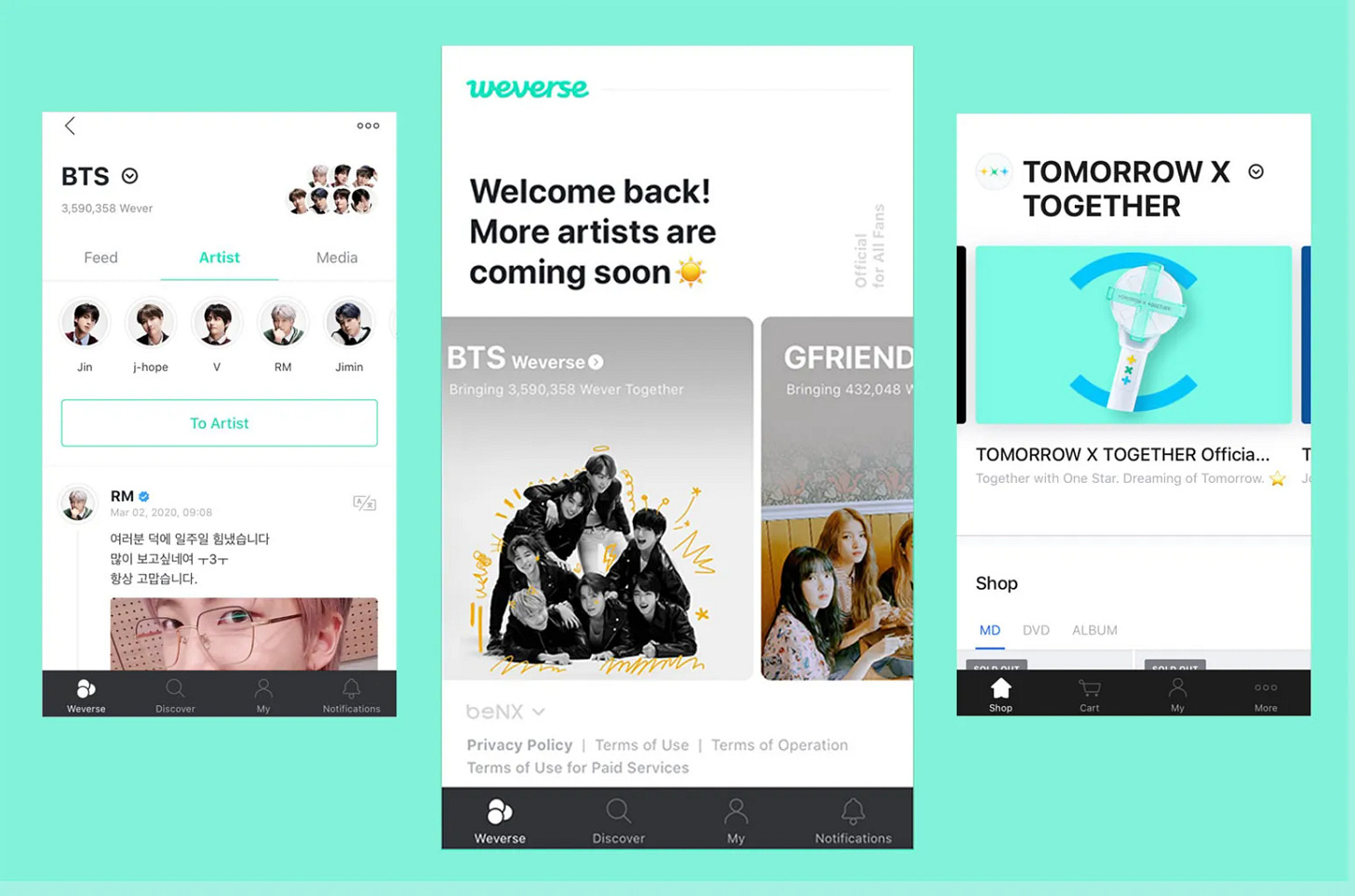What Startups can learn from Kpop + Fandom
The Science of Cultivating Fans
Every startup needs fans. If you want customers, employees, or investors to love your product and evangelize your mission and brand, you need fans.
I believe there is a science to building fandom. In fact, there’s no one better at this than K-pop groups to learn how to manufacture fandom on a global scale. K-pop fans are devoted - they sell out stadiums in minutes, consistently break records on Spotify + Youtube with billions of views, take over Twitter, and even contribute ~1% to Korea’s GDP*!
I’ve been an avid K-pop fan for the past 15 years - from the early days of BIGBANG to TWICE, and now NewJeans - I’ve watched countless hours of content and have always been fascinated by the world of K-Pop.
Here are 5 key strategies I think startups can learn from K-pop to build passionate fans.
1) Invest in Brand - It’s all About Identity and Story
K-pop groups pay meticulous attention to crafting a compelling brand identity.
First, they have instantly recognizable names and fan group names - BTS with their fan group “ARMY”, NewJeans with their fan group "Bunnies", or BLACKPINK's fierce "Blinks." This creates a sense of belonging and fosters a shared identity within the community.

It goes beyond aesthetics - each group comes with their own striking visuals with fantastic storytelling and messages. BTS promotes self-love and mental health awareness, while BLACKPINK messages fearlessness and confidence, each weaving in narratives in their music that resonate with their audience.
Brands, like K-pop stars, are not one dimensional. Though music is their core product (just like how companies have a core product as well), brand is about maintaining consistence outside of the music as well — on TV, in vlogs, in merch, etc. — the same core messages that BTS or BLACKPINK have weave through. For startups, this translates to defining your brand purpose. What drives you? How does your product or service make a difference? Craft a compelling narrative that speaks to your target market, one that goes beyond features and taps into emotions.
2) Highlight Individual Idols, But Maintain Group Cohesion
Part of brilliant brand storytelling is telling the story of both the group and the people behind the group. After all, people connect with people. This balance between individual talent and group synergy is a key ingredient in K-pop's success.
Take BLACKPINK: Jisoo is known for her powerful vocals and elegant visuals, Jennie for her rapping and stage presence, Rosé for her soulful voice and unique guitar skills, and Lisa for her exceptional dance talent. Despite their individual strengths, their performance is always extremely choreographed and cohesive.
Unlike many Western groups, K-pop idols also often participate in solo activities like releasing solo music or becoming brand ambassadors for luxury labels. BLACKPINK is a prime example – Jennie and Rosé have both released successful solo albums, while all the members have individual endorsement deals with high-end fashion brands like Chanel, Dior, and Celine. These solo ventures allow individual members to further showcase their talents and personalities, but they always circle back to promote BLACKPINK as a whole, strengthening the group's brand identity.
In the same way successful K-pop groups understand that promoting their individual idols will help humanize the group and foster deeper connections, the same idea holds for startups. Great companies know that the best way to build their brand and leverage distribution is by highlighting their founders and key team members and turning them into marketing advocates for your business.
Tactically, companies can build formal employee advocacy programs - encouraging employees to post brand-aligned content across Linkedin + Twitter that share their unique contributions, thought leadership, and personal stories. For example, OpenAI benefits from Sam Altman also having an individual personality, the same way that whether you like Elon Musk or not, he makes a meaningful impact on his companies as well.
3) Social Media Engagement & Distribution: Building in Public & Unique Ways of Community Building
K-pop thrives on transparency. Each K-pop member and group is omnipresent on social - usually on over 10+ channels - from Youtube, Instagram, Facebook, Weibo, TikTok, to fan apps like Weverse.
For example, BLACKPINK is the most-subscribed artist channel in the world, with over 93M subscribers, while BTS has over 77M subs on their BANGTANTV YouTube channel. Both are among the top 20 most subscribed channels in the world.
Content created on K-pop Youtube channels is unique. Unlike most Western music artists, content doesn’t just showcase music - it includes travel vlogs, cooking shows, to game challenges and dance tutorials. This unique approach allows idols to showcase their personalities and empower fans to become active participants in the K-pop experience.
Many K-pop groups also have dedicated apps like Weverse (owned by HYBE, a public entertainment company) where they host their fan communities. These apps offer features like exclusive content, membership benefits, online forums, and live chats, allowing fans to connect with each other and feel like part of a larger community.
Similar to K-pop fan communities, startups can leverage social media and Slack/Discord communities to foster customer engagement, share content beyond just their core products, and build brand affinity.
The recent "build in public" approach by OpenAI (e.g. ChatGPT, Sora model launches) and Stripe (publishing books via Stripe Press) exemplifies this philosophy of transparency and community building that has fueled the meteoric rise of K-pop.
One notable example is Stripe’s content arm Stripe Press, which publishes books and magazines to “share ideas about technological, economic, and scientific advancement.” In essence, Stripe Press enhances Stripe's positioning as an innovative thought leader, while acting as a brand-building, knowledge-sharing, talent attraction and potential revenue generation tool aligned with the company's strategic interests.
4) Focus on New Talent Development: Investing in the Future

One unique trait about K-pop is that its music is developed for the global audience from day 1. Groups like NewJeans and TWICE have members fluent in multiple languages, making their music more accessible to a global audience. YG Entertainment, the company behind BLACKPINK, is known for holding global auditions from various countries.
In fact, the Big 4 K-Pop companies (HYBE, JYP, SM, YG) are known for their rigorous trainee programs, honing talent (typically ages 11-15) from around the world for years before debut. These programs can last anywhere from 3 to 7 years, with trainees undergoing rigorous training in singing, dancing, rapping, language skills, stage presence, and even etiquette. This intense training period helps ensure idols are well-rounded performers ready for the grueling K-Pop schedule, but also pays crucial dividends in skill + mindset development, pipeline creation, and overall brand reputation.
For startups - while you might not have the resources for a K-pop-style bootcamp, consider educational content or internal training initiatives to cultivate future talent for your startup. In the same way that YC has developed YC Startup School to attract future founders and Google has their famous APM new grad + internship program to groom future product leaders, startups should invest resources into this early. Excellent talent makes or breaks startups, so this not only benefits your team but also fosters a sense of growth and opportunity within your community.
5) Fan Interaction via Events + Merch: Deepening Engagement & Building Loyalty
Merchandise and events further solidify the bond between artists and fans. Obviously music artists perform at concerts, but high-quality merch, like lightsticks (unique to each K-pop group) are a symbol of fandom pride. In fact, almost all K-pop groups have this concert accessory which is used as a bluetooth speaker and features various lighting modes that sync with the music during performances. In conjunction with the aforementioned online communities and in-person fan meetups + concerts, fans feel a deep connection not only with the artists but also with fellow fans in attendance.
We’re already starting to see the rise of “tech as lifestyle brands” with companies like Notion that create lifestyle merch and experiences that are untraditional from most tech companies. Startups can further extend their fandom + build their brand by creating unique merch items that become a symbol of being part of their community or movement. The key is making customers feel like they are part of an passionate community united by a bigger sense of purpose beyond just using the startup's offerings. Nurturing this tribal identity and giving it ways to actively manifest can breed the kind of fierce loyalty that K-pop fans exhibit.
Conclusion
I believe founder-led content on social is the new paradigm for startups. The science of fandom in K-pop is a fascinating case study for startups. K-pop's success hinges on a carefully crafted formula that prioritizes brand identity, fan connection, and continuous growth. By adopting these strategies – from building a compelling narrative to fostering a thriving online community – startups can cultivate their own passionate fanbase. Remember, loyal fans are your biggest advocates.
PS - if you want any recommendations for K-pop groups, my current personal favs are Le Serrafim, NewJeans, ILLIT, and EVERGLOW :)
This Korean Wave is called Hallyu, which refers to the phenomenal growth of Korean culture pop culture, entertainment, music since the 1990s. Fun fact - the Korean government’s Ministry of Culture has a $5.5B budget(!!) with the sole goal to boost economic growth through cultural exports. And it’s working, in 2019, Hallyu had an estimated $12.3B boost on the Korean economy, 6% of GDP! Obviously k-pop is only a small portion of this, but hard to say exact numbers.
I’ll personally caveat that the concept of highlighting Founders as Idols should be exercised with caution - while this tactic can lead to tremendous business success, it can also lead to the downfall of the entire company as we’ve seen with Elizabeth Holmes, SBF, and Adam Neumann.








